The Syrian War is All About Natural Gas
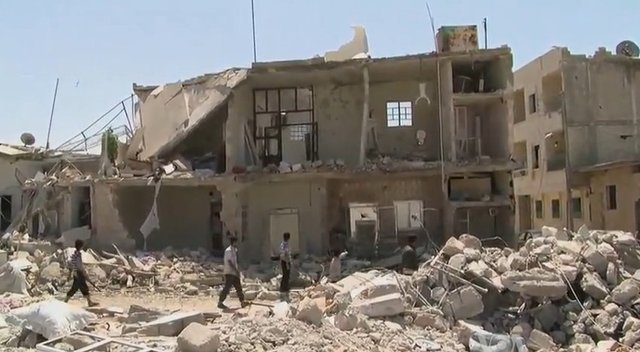
image credit
The official story of the Syrian War perpetuated by the media is that brave rebels in Syria are uprising against the brutal dictatorship of Bashar al-Assad, who in response has stricken once again with chemical weapons, killing innocent citizens. The US and allies have decided to punish Assad for his use of chemicals and have launched a missile airstrike at strategic targets on the morning of April 14, 2018. Many talk war.
However, world politics are never that simple. Despite the idealistic discourse presented on the media, interactions are complicated, and each movement is backed up and even fueled by powerful allies, who are after their own geostrategic and economic interests.
About a week ago, Assad’s regime apparently attacked innocent civilians in Douma, Syria, using chemical weapons. It’s been said there is evidence for that, but so far none of it was presented. Both Russia and the US had agreed that the incident must be investigated, but they disagreed on the methodology so nothing really happened. Furthermore, the airstrikes of the US, UK and France towards Syria happened before any investigation was carried out. There are several suspicious facts suggesting that the whole thing might have been staged, or that a chemical attack might have indeed taken place, but by a group other than Assad’s regime. This is because firstly, no reliable source has enough evidence of what really happened there and secondly, no motive has been found for Assad to order an attack at this particular moment in time, since he was already winning. Let’s not forget that only ten days before that, on April 4, Trump had instructed US troops to withdraw from Syria.
Could Assad have done it? Yes, ultimately, he could. But is there evidence that he did? Absolutely not. This is the step of the critical thinking process that most people don’t seem to comprehend. It’s not about who you support politically and it’s not about what your emotions dictate. It’s not even about what is suggested in the news. There is simply no way to know first-hand and prove who was behind the attacks because misinformation travels around like a broken telephone. You can use, however, logical arguments to reach a conclusion. If the US thinks that Islamist rebel groups are as reliable as Assad when possessing chemical weapons, and if the real reason why they want to attack is in order to prevent anyone in Syria from having access to these weapons, then why go to war in support of the Islamist rebel groups? And what if they are the ones who launched the attack after all? What would the US do if Islamist rebels actually came in power?
video credit
Come on guys, you know why big powerful countries decide go to war thousands of miles away! You don’t? Well let me tell you why. It’s for two main reasons:
1: Strategic control of the area. You don’t want other newly formed superpowers to get stronger than you while you peacefully mind your own business governing your own territory.
2: Fossil Fuels. I can’t stress this enough. This is also the reason why I’m personally so obsessed with advancements on renewable energy technologies. It’s not a coincidence that there have been at least two rival plans for two major pipelines transporting natural gas from the Middle East to Europe passing through Syria!
So what is really going on?
What happens is that Russia currently supplies Europe with about a quarter of the natural gas it needs. Russia’s economy is based on exporting fossil fuels and Europe is its biggest natural gas market while having the largest growth market for gas. Russia can’t afford to lose it! However Europe doesn’t want to rely on Russia’s monopoly and is trying to become more independent by looking for ways to import natural gas from different sources. This move is supported by the US because it would weaken the Russian influence on Europe. As a result, countries of the Middle East are now trying to provide new sources of gas to Europe.
The world’s largest natural gas field is in the Persian Gulf, with roughly two thirds of it owned by Qatar and another third of it owned by Iran. In 2009, Qatar planned building a pipeline that would transport natural gas to Europe, passing through Syria and Turkey. The Syrian president Bashar al-Assad declined it, citing friendly relations with Russia and Gazprom, Russia’s biggest natural gas company. Two years later, Qatar’s rival Iran proposed another pipeline plan to supply Europe that would pass through Iraq, Syria and Lebanon. With Russian influence being more prominent on Iran, Assad signed the plan. Soon after that, Syria also discovered gas reserves in its own territory, which Russian Gazprom would most likely operate if Assad managed to remain in power.
image credit
In favor of the interests mentioned above, Qatar and its allies have funded anti-Assad Islamist rebel groups in order to overthrow Assad, which is a move that if successful it would benefit the US since Assad is a firm ally of Russia and Iran and an obstacle for the control of the EU natural gas market by the UAE and Saudi Arabia. Qatar has also invested in the European economy, especially in French, British and German companies, forming economic partnerships.
On the other hand, Iran and its allies have been helping Assad remain in power, in benefit of Russia. Furthermore, Putin’s Russia has taken major steps with China and other nations to lessen its dependence on the West. Gazprom's Power of Siberia pipeline will be delivering natural gas to China by the end of the year, and a second pipeline is already under discussion. With China also agreeing to import hydrocarbons from Russia's ally Iran, the issue for the US is not only Russian empowerment and influence on the EU, but also winning over China! Let’s not forget Iran’s nuclear program, which adds to the threat of the Russian-backed axis becoming a superpower.
The division was intensified by the fact that the two rival groups of Middle-Eastern countries belong to two different religious branches: The Sunnis and the Shiites. Saudi Arabia, as well as the Gulf Emirates, Kuwait and Qatar, belong to the Sunni branch of Islam. Saudi Arabia actually follows an ultra-conservative form of Sunni Islam called Wahhabism. Countries supported by the US are in their majority Sunnis. This is how fundamentalist groups of the Sunni branch, such as the Muslim Brotherhood, have essentially been backed and financed by the US. The US has trained rebels fighting Assad such as Al Qaeda terrorists, religious fundamentalists who were already motivated by religious differences between Sunnis and Shiites. The Sunni leadership came to be an intolerant and radical movement, fueled by Western power motives. Saudi Arabia, Qatar and UAE also aided the Islamist opposition to Assad, including Sunni ISIS.
On the other hand the majority of Iran, Iraq, as well as Syria’s Assad governing minority called Alawites, are of the other main branch of Islam, the Shiites. Russia has managed to form an alliance with Shiite-dominated countries, that came to be called the “Shia Axis of Resistance” and includes the Lebanese militant group Hezbollah. The alliance aims to oppose Western-based interests, such as those of the US and Israel, in the region.
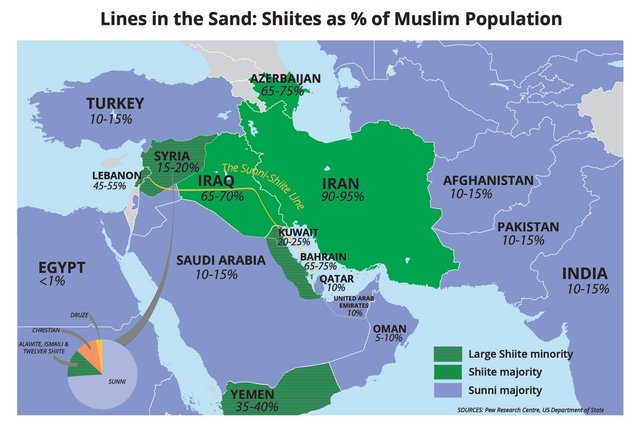
image credit
In 2011, the US and Saudi Arabia made a deal of mutual support, in which Saudi Arabia would support the airstrikes against ISIS while the US would help them toppling Assad in return. That’s because although Saudi Arabia did contribute in the formation of ISIS in the first place, they eventually began losing control of its Islamic radicalism and ISIS ended up threatening the King’s position in Saudi Arabia. ISIS members believe that the king is defaming Islam by cooperating with infidels such as the US and Israel, and view his governance as attending to the interests of the West. Saudi Arabia, as well as the US which also feels threatened, are since then cooperating in their effort to eliminate ISIS.
Then there is the question of Turkey’s complicated position on the matter. Turkey is a member of the NATO and initially, the fact that Assad did not allow the Qatar pipeline planned to pass through Turkey meant that Turkey would lose their part of the natural gas game. Turkey was therefore more of a US ally. However, after its proposal was rejected, Turkey signed in 2014 a new deal with Russian natural gas company Gazprom for a pipeline plan called TurkStream planned to transport natural gas from Russia to Turkey, as well as export it through the Turkish-Greek borders to Europe. The project is currently under construction, and as of January 2018 Gazprom received an authorization from Turkish authorities for a second line to be constructed. The new partnership with Russia has shifted Turkey’s loyalties to a great extend, but in the Syrian issue its position remains quite complicated due to the Kurdish issue.
The Kurds are indigenous people from a zone that is now covering parts of Turkey, Syria, Iraq, Iran and Armenia. When borders were set after WW1 there was no provision for a Kurdish state formation, leaving them as minorities in different countries. Their objective is the creation of an independent state, which goes against the interests of their host countries and is therefore denied and any of their efforts destroyed. Turkey is involved in fighting Syrian Kurds because it has a high Kurdish population of its own to lose if it allowed an autonomous Kurdish state called Kurdistan to be formed.
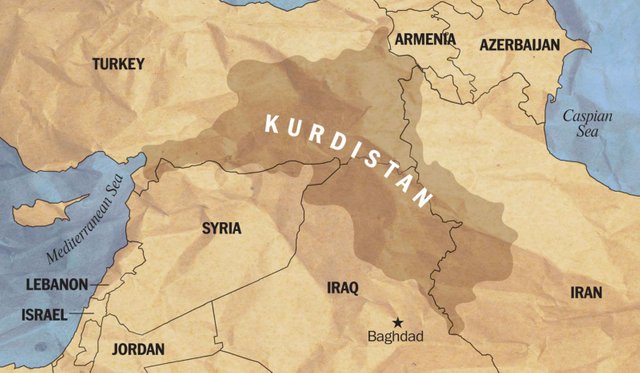
image credit
When Turkey felt threatened by the presence of Kurdish militia on its southern border with Syria, it launched an assault on the Afrin region. Although Assad opposes the Kurds demands for autonomy, he ended up supporting Syrian Kurds to some extent, to defend its border from Turkey and also because Kurds became a critical force in the fight against the Islamic State, rebels of which Turkey financed and in return received aid from in Afrin. However, Assad's support was mostly passive and he did not launch a counter-attack. Russia was accused of giving a green light for the Turkish attack by withdrawing observers it deployed in Afrin the year before and allowing Turkey into the Syrian airspace, as well as by ensuring that Assad would not take advantage of the situation.
Natural Gas in the Eastern Mediterranean
Right now there is a new complication into the region’s area related to disputes over natural gas fields. New reserves of natural gas have recently been discovered in the Eastern Mediterranean sea, mainly within the offshore maritime zone of the island of Cyprus. The maritime zone of Cyprus is based on legal agreement signed by the majority of states and the EU called “Law of the Sea”, which states that an island has the same provisions as any other land. However, Turkey was one of the minority of countries that did not sign the agreement and does not recognize the maritime borders of Cyprus, claiming much of the area containing natural gas as its own.
Turkey also has an ongoing dispute with Greece over the delimitation of their exclusive economic zones in the Aegean sea, with most islands in the zone belonging to Greece. Permitting a large maritime zone for islands would cause Turkey to lose essentially all opportunities for economic exploitation of the Aegean. Last month a Turkish naval ship intercepted an exploration vessel in Cyprus waters, threatening to take all necessary actions to stop the drilling.
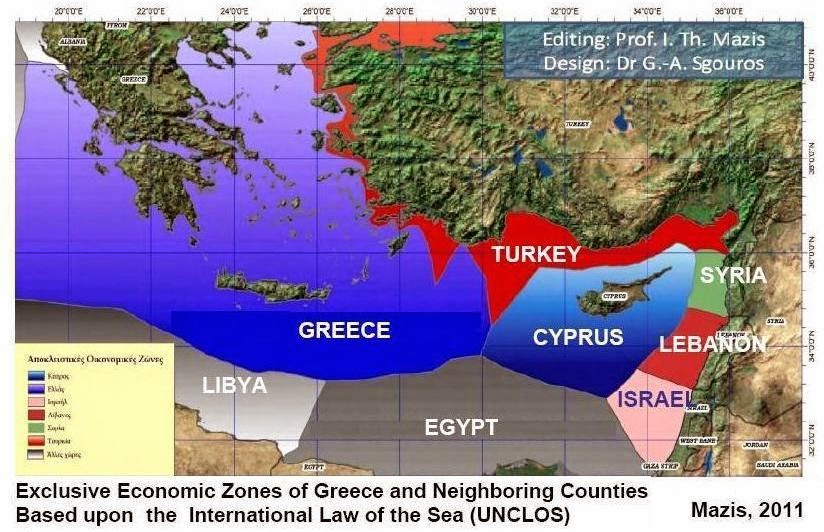
image credit
In the meantime Cyprus has signed maritime delimitation agreements for economic waters with Israel, Egypt, and Lebanon. These newly discovered natural gas fields are planned to be mined with the purpose of exporting gas to Europe. The US supports the move as it is another opportunity to limit Russia’s control in the natural gas market. By contrast, Turkey has refused to take part in a similar delimitation agreement. Even though before Turkey used to have more interests in supporting the US rather than Russia, this new US-backed plan does not really include Turkey’s best interests and Turkey is found to be swinging in the middle of the two superpowers, currently working to improve its alliance with Russia.
Who controls Syria, and generally the Middle East, will have a huge advantage to controlling the natural gas market. External politics are not as simple as a vague moral dilemma of the “we need to kill the bad guys and save humanity and our country” type. Every single point I have made in this post could be expanded to include even more interactions and complicated relationships that point to different interests. However, ultimately, these are mainly driven by the fossil fuel economy.
Sources:
[1], [2], [3],[4], [5], [6], [7], [8], [9],[10], [11], [12], [13], [14], [15], [16], [17], [18], [19], [20], [21], [22], [23], [24]

Great reminder of what many of the underlying motivations are for this conflict. But, gas and oil isn't the guiding issue anymore. The Qataris are beaten on that pipeline and have cut deals with Iran to develop the North Pars gas field which they share and to build an alternate pipeline with Iran to serve Europe.
This is why Saudi Arabia went ballistic last year on Qatar, after Qatar bought a stake in Rosneft to ensure it's survival when it became clear to them that Trump would no longer suppor their support of Al-Qaeda in Syria and Assad was likely to stay in power.
What's left of the original plan for Syria is some desperate thrashing around by the Neocons in the U.S. and the their ideological brethren in Israel/SA to limit Iran, humiliate Russia and break up the alliance with China and complicate OBOR.
Thank you for your contribution and for resteeming! It does seem that the US is losing Qatar to Russia. Apparently Russia is currently selling weapons both to Qatar, who now feels threatened by Saudi Arabia, and Saudi Arabia! Russia is also taking advantage of the situation to negotiate sales of their own natural gas to Saudi Arabia, while Qatar is now working on deals to collaborate with Gazprom. I wonder how the US will tackle this.
You see, it's still about fossil fuels. Because fossil fuels define markets, markets define the economy, and the economy defines power. For example, what would be the impact of a Russian-Chinese collaboration on oil and natural gas on the petrodollar and the US dollar as a no. 1 currency? What makes things really complicated (actually much more complicated than I tried to portrait for simplicity) is that geopolitics are not defined solely by countries (or state companies) but by private or semi-private companies as well. A semi-private company might be trying to keep its own state and a private investor from a rival state, both happy and serve interests of both to keep a balance. This is how things get out of hand when trying to find out exactly who's interests a particular action serves, because global economy is a jungle and alliances shift as fast as options do.
It's more or less a last attempt to get as much resources as possible, however I don't see any profit for getting oil or gas anymore as our needs are changing according technology, we are more reliant upon electricity than we are on oil.
Thank you for your comment. However, electricity is still produced by burning oil, coal and natural gas. Electric cars for example, you still need to charge them at an electric station, and this electricity is produced in factories that burn fossil fuels. Unfortunately we are still far from running on renewable energy sources alone.
Thanks I actually spoke before I thought 😅, however yes as you said we are far away from renewable energy. The problem is we can be further into if only the government see that it's more self sustaining to build renewable energy than it is invading other countries. However, their corporate masters aren't too pleased if they make that decision, after all war is their livelihood.
Congratulations @elemenya! You received a personal award!
You can view your badges on your Steem Board and compare to others on the Steem Ranking
Vote for @Steemitboard as a witness to get one more award and increased upvotes!